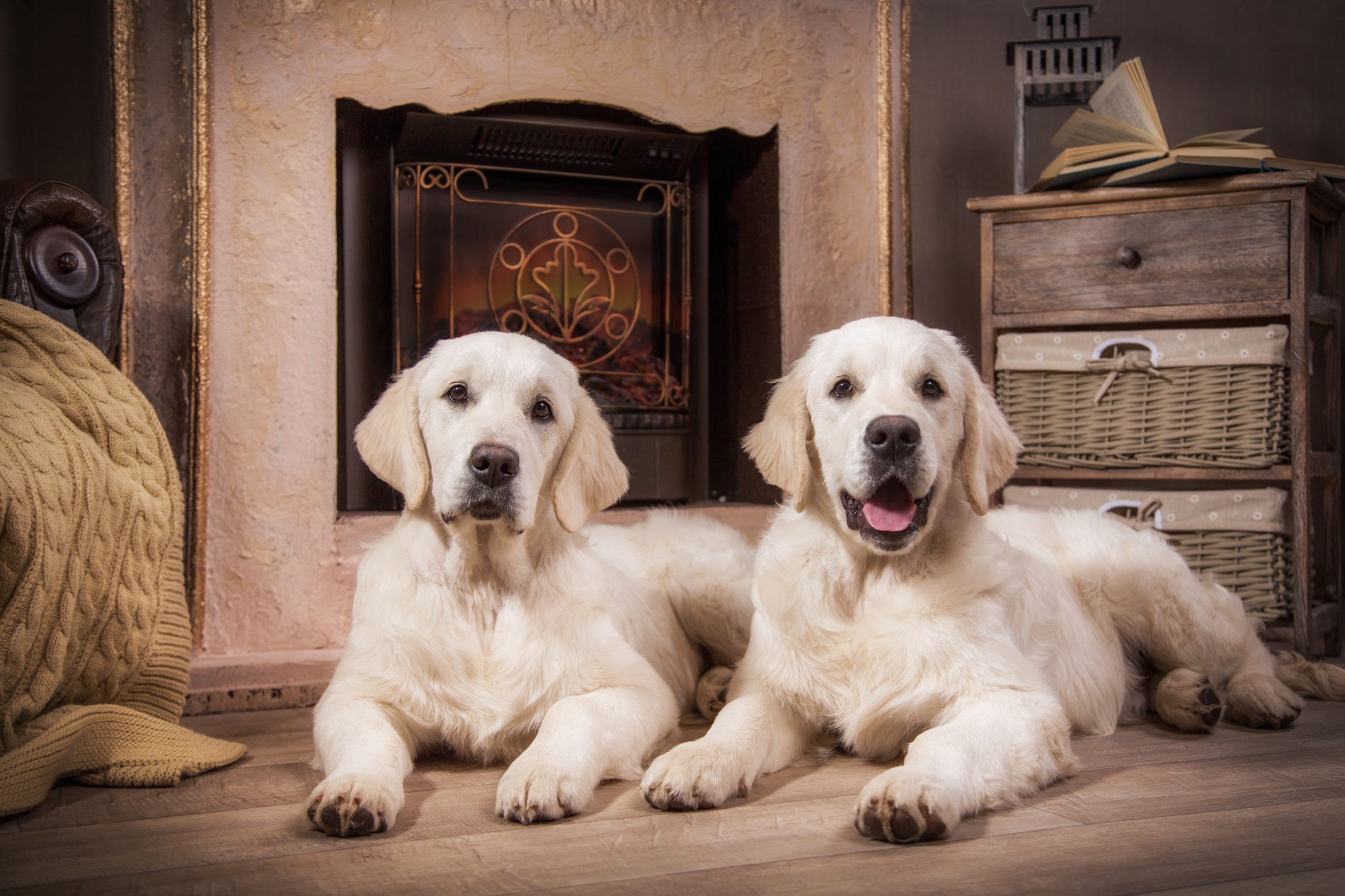Excitable, lovable, and tremendously cute, Golden Retrievers are a beloved mid-sized breed with a kind and valiant disposition. These pups love to work hard, play hard, and impress their owners in any way they can. With intelligent, expressive eyes, a sturdy frame, and their signature golden coat, Golden Retrievers have long been a staple of American households.
Golden Retriever Average Size and Life Expectancy
- Height: 21-24 inches
- Weight: 55-75 pounds
- Life Span: 10-12 years
Golden Retriever Characteristics and Traits
Friendliness
Affectionate with family 5/5
Golden Retrievers live for their owners. You can expect your Retriever to greet you at the door, sleep at the foot of your bed, and run to you for comfort when they’re upset.
Good with other dogs 5/5
Social and agreeable, most Golden Retrievers get along splendidly with other dogs. All dogs are capable of aggression, but due to this breed’s intelligence and trainability, minor behavioral problems can be easily remedied.
Good with children 5/5
Sweet enough for toddlers but tough enough to handle a little horseplay, Golden Retrievers are a great pick for families with kids. Patient and kind, their temperament makes them a great child-friendly breed.
Good with strangers 4/5
A well-trained Golden Retriever is rarely suspicious or anxious around strangers. That said, they can be a little overly friendly. Retrievers are known to jump on new friends for an enthusiastic, yet often unwelcome greeting.
Adaptability
Adapts well to apartment living 3/5
Goldens can adapt to nearly anything, including tiny apartments. That being said, these dogs will need to get outside and stretch their legs frequently, so certain busy lifestyles may clash with this pup’s needs. Still, with proper training and regular exercise breaks, you can expect them to thrive in smaller environments.
Good for Novice Owners 3/5
If you’re up for a high-energy pup that needs stimulating activity multiple times per day, a Golden Retriever will be a lovely and rewarding companion. If you’re a first-time dog owner a little unsure about your availability, you may want to consider a slightly less physically demanding pup.
Sensitivity level 5/5
This breed is highly sensitive to its environment. Expect your Golden Retriever dog to react to your mood as well as environmental stimuli, from the mailman to a thunderclap.
Tolerates being alone 1/5
Due to their sensitive nature, Goldens are prone to anxiety and fear if left alone for extended periods. They may also resort to destructive behavior when feeling unhappy.
Tolerates cold weather 4/5
Many Golden Retrievers actively enjoy playing in the snow when the temperatures drop. A long coat ensures your pup will be prepared for the winter, but on extra frigid days, consider bundling them up in a jacket or limiting outside time.
Tolerates hot weather 3/5
Golden Retrievers are comfortable in the mild heat, but once temperatures rise above 90 degrees, they’re at serious risk for heat stroke.
Health and Grooming Needs
Shedding level 4/5
How much dog hair loss should you prepare for? Expect mild shedding throughout the year and two major undercoat sheddings twice per year. For a few weeks every spring and fall, you may have to up your brushing and vacuuming frequency.
Coat grooming frequency 3/5
Keep your Golden happy with regular coat brushing and teeth cleaning every week. In addition, nail clipping, baths, and the occasional groomer visit can go a long way to maintaining your dog’s overall health.
Drooling level 3/5
Most often, Golden Retrievers drool for a reason. Whether you’re holding on to their favorite bone, dishing out their dog food, or tempting them with an exciting walk, Goldens can let some spit fly.
Coat type/length 3/5
Lustrous, luminous, and waterproof, the Golden’s coat is soft and protective. These thick double-coats are among the most well-known Golden Retriever characteristics. They not only look good, but they also keep these pups insulated from the elements.
General health 2/5
The Golden Retriever breed, like many large dog breeds, is prone to several heart and lung problems, in addition to hypothyroidism, joint issues, and some cancers. Still, these dogs typically live happy lives into their double digits when properly cared for.
Potential for weight gain 4/5
Golden Retrievers are highly food-motivated, frequently begging for an extra treat or searching for table scraps after a meal. Do your best to avoid overindulging your pooch. Excessive weight gain can lead to other health issues for your dog and lower their quality of life.
Size 3/5
A healthy, male Golden Retriever stands at around 2 feet tall and shouldn’t weigh more than 70 pounds. The average Golden Retriever size falls in the upper-middle of dog breeds, or as their owners like to say, “Not too big. Not too small.”
Trainability
Easy to train 5/5
With proper training, Goldens can comprehend complex commands and complete multi-part tasks. Goldens are one of the easiest dogs to train and always looking for new ways to please their owners, so training should come easy.
Intelligence 5/5
Despite their happy-go-lucky goofball demeanor, Golden Retrievers are highly intelligent. Their adaptability, communication skills, and sensitivity to human emotions make their intelligence indisputable. When ranking breeds by intelligence, Golden Retrievers are routinely in the top five.
Prey drive 2/5
Golden Retrievers were once bred as hunting companions, but that doesn’t mean they’re eager to find prey. On average, Goldens are more interested in their human companions than finding smaller animals to catch.
Tendency to Bark/Howl 2/5
A naturally quiet breed, the Golden Retriever dog breed will usually only bark as a friendly “hello” rather than a menacing threat. These dogs are one of the friendliest dog breeds and weren’t bred as watchdogs, so they use their bark primarily to get the attention of their owner.
Wanderlust potential 2/5
Your Golden Retriever should be eager to leave the house for an exhilarating walk, but they’ll only enjoy it if you’re right behind them. Your pup probably won’t want to explore without you, as they’d most likely feel sad, scared, and alone without their favorite person.
Physical Needs
Energy level 5/5
These pups are high-energy from the second they wake up to the moment they curl up in their doggy beds at night. They’re the perfect family dog for individuals with active lifestyles looking for a pup to tag along on exciting adventures.
Intensity 3/5
Goldens may have energy for days, but they aren’t the type to pull on their leash, act out, or push themselves to the point of exhaustion. There’s a sense of restraint when it comes to Golden Retriever dog breed behavior.
Exercise needs 5/5
Known as a “sporting breed,” Golden Retrievers require about 90 minutes of exercise per day. Many owners decide to break this up into two or three walks, on top of games and unstructured playtime.
Playfulness 5/5
Even when your Golden grows up, they’re likely to still act like a puppy. Running, jumping, fetching—these are daily activities for a Golden of any age.
Mental stimulation 5/5
A variety of tasks, toys, and puzzles can keep your Golden Retriever fulfilled and stimulated. Occupy your pup’s mental energy with Tug of War, chew toys, and plenty of training to avoid boredom and unease.
More About Golden Retrievers
Looking to discover more about the Golden Retriever profile? Why not start with their balanced, muscular frames and welcoming smiles. From their shiny golden coats to their short flopping ears, these dogs embody a spirit of friendly adventure and fun.
Bred as working dogs, Golden Retrievers have retained a number of their original skills—most notably, their preternatural ability to fetch, or retrieve. Additionally, Goldens are fantastic swimmers and divers, capable of reaching depths of 15 feet. You might think your dog is part fish once you see them out on the water.
Goldens have easygoing personalities, but it’s not always easy to keep up with them. Golden Retrievers demand a great deal of attention, exercise, and stimulation to maintain their mental and physical health. Often, the best way to keep your Golden in tip-top shape is with focused activity and rigorous training. Their enhanced intelligence and their history as working dogs ensure that you’ll be able to train them to sit, speak, shake, and so much more.
Golden Retriever History
Golden Retriever history begins with Lord Tweedmouth, a Scottish statesman, businessman, baron, and reputable breeder. In the mid-1800s, Lord Tweedmouth crossed a Wavy-Coated Retriever with a Tweed Water Spaniel, in an effort to breed a new type of retrieving dog.
Almost instantaneously, Tweedmouth’s dog breeds became popular amongst European hunters for their impeccable abilities in the field, and by the early 20th century, the Golden was recognized as a distinct dog breed by The Kennel Club in England. Soon, their popularity would expand not only across Europe but to the United States as well.
Following World War I, several other countries began distinguishing the Golden Retriever breed. By 1932, the American Kennel Club recognized the dog breed in a watershed moment for dog history. As one of the most popular breeds in the U.S., Golden Retrievers continue to find their way into hearts and homes across the country.
Golden Retriever Facts
- Despite the Golden Retriever gaining massive popularity over the subsequent years, the breed has never won Best in Show at Westminster.
- They may be called Golden Retrievers, but the coat colors of this breed vary from off-white to light brown.
- Because of their calming presence, Goldens are often utilized as therapy dogs.
- Golden Retrievers are premier sporting dogs, capable of running, jumping, hiking, and swimming right alongside you.
- There are three variations of the Golden Retriever: English, Canadian, and American.
- Golden Retrievers have webbed feet. Along with their water-repellent coat, this feature makes them unrivaled swimmers in the canine world.
What You Need to Know as a Golden Retriever Owner
Friendly, silly, and a whole lot of fun—becoming a Golden Retriever owner is highly rewarding. Before picking out your Golden Retriever puppy, it’s worthwhile to consider the details involved in caring for this breed. Understand these essential Golden Retriever facts before welcoming one into your home.
Golden Retriever Health & Preventative Care
Known for their high endurance and high energy levels, Golden Retrievers are a naturally healthy and robust breed. So, what are the potential health concerns you should watch out for? Unfortunately, due to their size, they’re prone to joint issues such as hip dysplasia and cruciate tears, as well as eye problems, ear infections, skin conditions, cancer, and heart disease. Regular veterinary checkups are essential to keep up with necessary preventative routine care.
Golden Retriever Temperament & Emotional Wellness
To feel their best, Golden Retrievers need plenty of activity and human interaction. For those who spend extended time out of the house, doggy daycare is a great option to fulfill your pup’s social needs when you have other obligations. When all their needs are met, Golden Retrievers are big, furry balls of joy, eager to show their owners love.
Golden Retriever Environmental
Golden Retrievers can thrive in a bustling city, out in the country, or anywhere in between. So long as they’re given plenty of daily exercises (and a chance to retrieve), any loving environment can be ideal. That being said, the length and density of your dog’s particular coat
might influence how well they fare in either cold or warm climates—all Goldens are wonderfully unique.
Golden Retriever Exercise & Play
The top concern of any Golden Retriever is exercise. Without 60 to 90 minutes of activity every day, your pup may lose its playful spirit and gain excess weight. Besides daily walks, you can enjoy games of fetch, hiking, swimming, and plenty of other high-endurance activities with your pooch.
Golden Retriever Behavior & Training
Training your Golden Retriever should be a breeze with the right techniques. As people-pleasing dogs, you can expect your Golden to respond to positive reinforcement, treats, and praise. The younger you start, the better. Even as Golden retriever puppies, they crave the excitement of learning a new task and executing it for their owner. Try mentally stimulating tricks and tasks after they’ve nailed easier commands like sit and stay.
Golden Retriever Nutrition
These food-loving pups need a strict diet to avoid gaining excess weight. That means minimal table scraps and measured portions for every meal. When training, treats are a must, but keep a close eye on how many you feed your Golden Retriever puppy on a daily basis. As always, a quality dog food or specially prepared meal is essential for maintaining your Golden’s overall health, and any issues around food should be immediately addressed with the help of a vet.
“What’s the best way to keep up with your Golden Retriever’s health needs? The AskVet App instantly connects you with a licensed veterinarian.”






